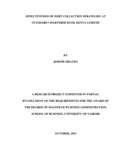| dc.description.abstract | The main objective of this study was to evaluate the effectiveness of debt collection strategies at Standard Chartered Bank Kenya Limited. The study was justified by the need to address the dismal performance of debt collection strategies at SCB. In addition, there was need to address the soaring loan default at SCB and by extension inform the way forward for other commercial banks and other lending institutions. The study adopted a case study design and collected primary data by use of interview guides and secondary data from audited financial reports, news bulletins and the official website of SCB. A total of 5 interviewees were targeted. The interviewees included the Collections Strategy Manager, Credit Documentation Manager, Manager Collections (Small and Medium Enterprises), Manager Collections (Personal Loans and Mortgages), and Manager Recoveries. The collected data was cleaned and coded before being analyzed by use of the Statistical Package for Social Sciences (SPSS). Data analysis was done through content analysis of the responses of the interviewees in line with the three main themes: Types of debt collection strategies, effectiveness of the debt collection strategies and the measures to improve the debt collection strategies. The findings were presented in form of a report on the thematic areas. Major research findings indicated that the main debt collection strategies at SCB included litigation, debt collection agencies, change of payment terms and constant reminders. The findings also indicated that the most effective debt collection strategies were change of payment terms and constant reminders while litigation and debt collection agencies were found to be ineffective and costly. The main conclusion was that the poor debt collection was a result of poor prioritization of debt collection strategies, inadequate financing of debt collection strategies and lack of motivation among the debt collection staff. The researcher recommends introduction of laws and regulations to allow for a provision to attach international assets of loan defaulters. There is also need to introduce arbitration clauses in loan agreements so that the process of litigation and associated costs can be minimized. In practice, there is need to make it a matter of policy that the litigation and debt collection strategies should be used as last resorts after the failure of constant reminders and change of payment terms. In addition, there is also need to increase budgetary allocations towards improving capacity and motivation level of the debt collection staff and also invest in research and development towards more effective debt collection strategies. Lastly, the researcher suggests that a similar study that targets managers and junior staff, be carried out to come up with a model to guide the establishment of appropriate debt collection strategies. | en |

